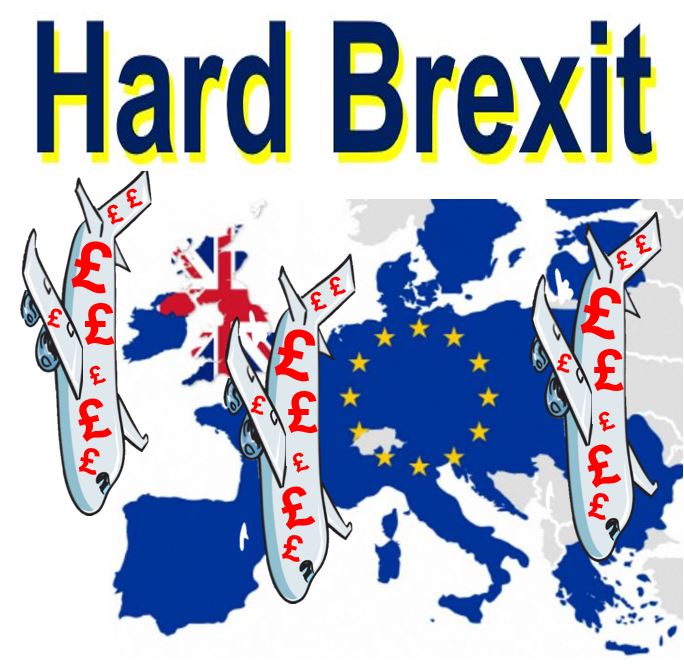Any hint of a Hard Brexit kills the pound, pushing it down as investors, currency traders and other financial institutions run for cover. On 23rd June, when the British electorate voted for Brexit – Britain Exiting the EU – the pound sterling went into freefall, as did the FTSE 100.
The stock market soon recovered, but the pound remained week – at least 10% below its pre-referendum value for months.
As talk of a Hard Brexit erupted during the Conservative Party Conference, the pound went into another freefall. This time it took the Government and Bank of England by surprise. Within six minutes of the first significant mention of a Hard Brexit, the pound declined by 6%. It is now 15% below its value before the Referendum, at a 31-year low against the US dollar.
 Of all the forecasts and warnings or assurances that politicians and economists have given us, there is one thing we can now be completely certain about – THE POUND HATES A HARD BREXIT.
Of all the forecasts and warnings or assurances that politicians and economists have given us, there is one thing we can now be completely certain about – THE POUND HATES A HARD BREXIT.
Hard Brexit refers to the UK regaining total control over its borders – complete control over immigration policy. However, it probably also means losing unfettered access to the EU market of 500 million people, who represent half of all UK exports. It would also mean UK-based financial institutions losing their passporting rights – the ability to operate all over the EU without having to approach each country’s authorities separately.
Soft Brexit refers to a more semi-detached relationship with the EU. The UK would retain free access to the EU market as well as its passporting rights. However, the country would have to sign up to the free movement of people – it would not have control over the immigration of EU citizens into the country.
Businesses dread a Hard Brexit
The vast majority of businesses across the UK dread a Hard Brexit, especially those that export their goods and services.
If Britain lost unfettered access to the EU market, exports would be clobbered with a 10% to 20% tariff. The result would be a massive decline in sales, UK investments from Japanese, US, Korean and other companies would dry up completely, and financial institutions would move much of their operations across the channel into continental Europe. Even British multinationals would move their planned UK investments to their bases in Europe.
90% of UK goods could have tariffs under #WTO rules, @cbicarolyn tells @bbcnickrobinson on @BBCr4today https://t.co/HBvDfRy6yI
— The CBI (@CBItweets) 8 October 2016
On Friday, the UK’s business leaders sent an open letter to Prime Minister Theresa May urging her to avoid leading the country into the wilderness. They warned of serious and long-term damage to the country’s economy and the likelihood of an alarming rise in unemployment if access to the EU market was lost.
Soft Brexit would be political suicide
The main reason Britons voted to leave the EU was to regain control over our borders. A Soft Brexit would not achieve that. In fact, a Soft Brexit would be a step backwards – the UK would still have to accept the free movement of people, but would no longer have any say in EU lawmaking.
If Theresa May and her Cabinet agreed to a Soft Brexit, it would be the kiss of death for her and her colleagues’ political careers.
Here, we have a good, old-fashioned Catch 22 situation. Go for a Hard Brexit and kill the pound and much of the country’s economy, or opt for a Soft Brexit and expose yourself to the fury of 51% of the country’s electorate.
EU leaders clear on Hard Brexit consequences
This week, French President Francois Holland, German Chancellor Angela Merkel, EU Commission President Jean-Claude Juncker, and others made it clear that there is no way Britain would have unfettered access to the trading bloc if it insisted on regaining total control over immigration.
On Thursday, Mr. Hollande said:
“The UK has decided to do a Brexit. I believe even a hard Brexit. Well, then we must go all the way through the UK’s willingness to leave the EU. We have to have this firmness.”
“[If not] we would jeopardise the fundamental principles of the EU. Other countries would want to leave the EU to get the supposed advantages without the obligations. There must be a threat, there must be a risk, there must be a price.”
Michel Sapin, France’s Finance Minister, said:
“There will be activities taking place in London that will only be able to take place on the territory of the European Union.”
Mr. Junker added:
“You can’t have one foot in and one foot out. We must be unyielding on this point.”
Fearing a spread of anti-EU sentiment across the continent, German Chancellor Angela Merkel warned:
“If we don’t insist that full access to the single market is tied to complete acceptance of the four basic freedoms, then a process will spread across Europe whereby everyone does and is allowed what they want.”
“We have to make sure our interests are coherent here so that we won’t be put under pressure constantly via European industry associations to eventually allow full access to the internal market even if all freedoms aren’t respected.”
One thing is definitely clear, the pound is absolutely against a Hard Brexit.
Video – Pound sterling hits 31-year low
The pound sterling has not been this low since the Reagan-Thatcher years – specifically 1985.
